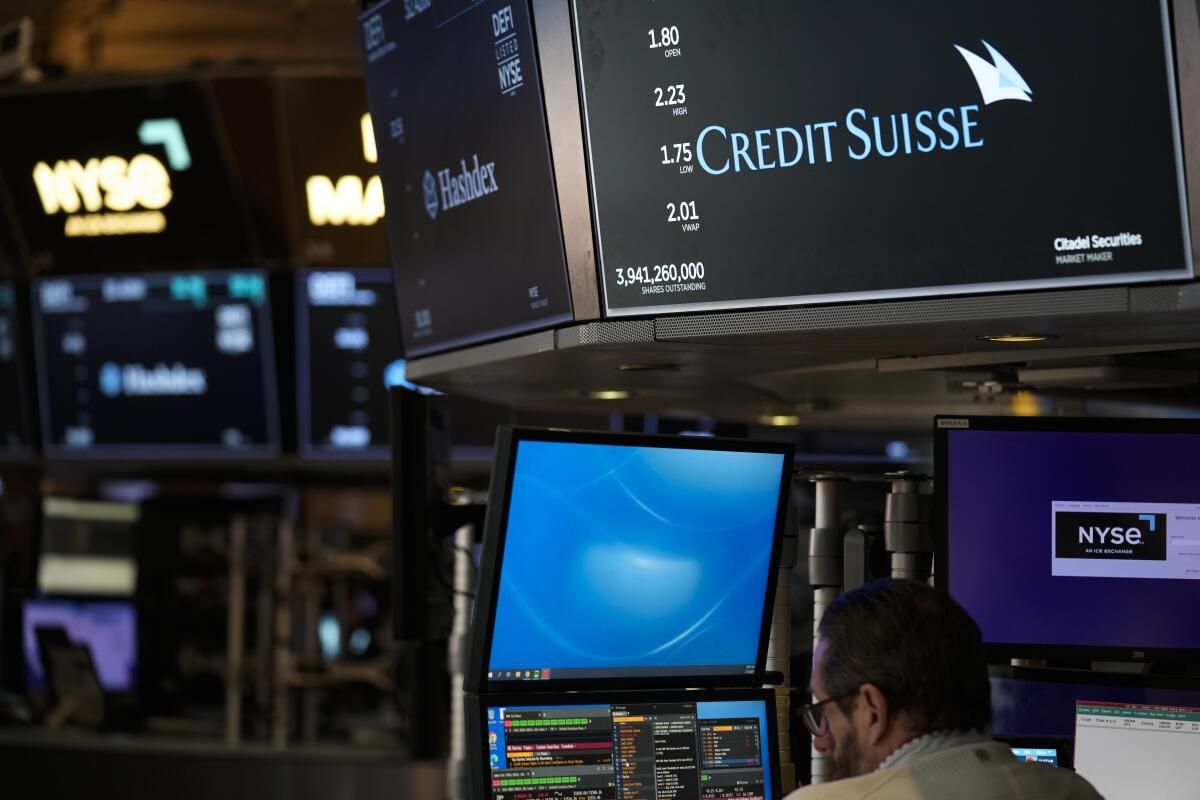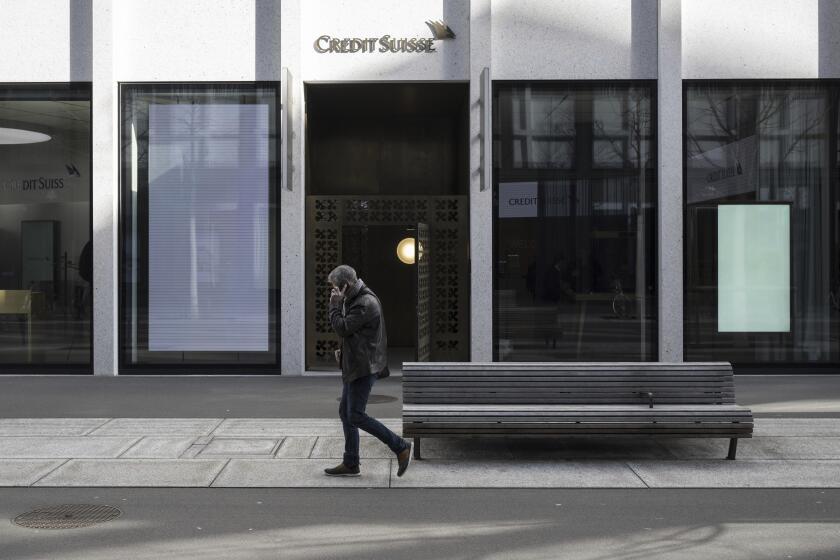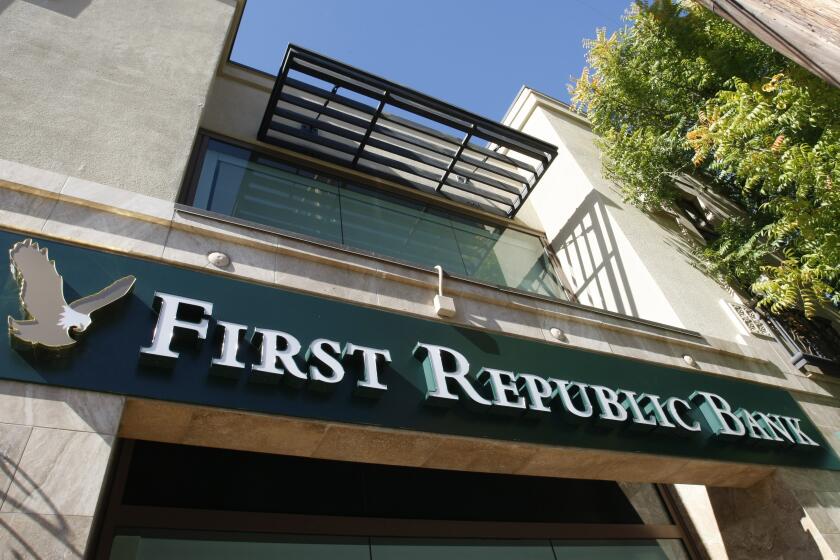Stocks rally after battered First Republic gets a lifeline

- Share via
Stocks rallied Thursday after a group of big banks offered a lifeline to the bank that investors had zeroed in on in their hunt for the industry’s next victim.
The Standard & Poor’s 500 jumped 1.8% for its best day in nearly two months after 11 of the biggest banks said they would deposit a combined $30 billion into First Republic Bank. The Dow Jones industrial average erased an early loss of 300 points to climb 371 points, or 1.2%. The Nasdaq composite jumped 2.5%.
This week has been a whirlwind for markets globally on worries that banks may be bending under the weight of the fastest set of interest rate increases in decades. The concerns have been flaring since Friday’s collapse of Silicon Valley Bank, which was the second-largest bank failure in U.S. history.
Since then, Wall Street has tried to root out banks with similar traits, such as lots of depositors with more than the $250,000 limit that’s insured by the Federal Deposit Insurance Corp., or lots of tech startups and other highly connected people that can spread worries about a bank’s strength quickly.
First Republic Bank has been at the center of the market’s swivels, and it rose 10% on Thursday after slumping as much as 36% early in the day. In the statement announcing their deposits, the group of 11 banks said the move “reflects their confidence in First Republic and in banks of all sizes.”
Credit Suisse’s shares soar after it says it will move to shore up its finances by borrowing up to nearly $54 billion from the Swiss central bank.
Besides stocks, Treasury yields also strengthened suddenly after the first reports of a possible rescue by the industry. That was a sign of increased confidence from the bond market.
Across the Atlantic, European stocks rose after the European Central Bank announced a hefty increase to interest rates. Concerns there were also easing about another bank, Credit Suisse, which had fueled markets’ sharp tumble Wednesday. The Swiss bank has been battling troubles for years, but its plunge to a record low Wednesday raised concerns just as more attention was shining on the wider industry.
Credit Suisse shares in Switzerland leaped 19.2% on Thursday after the bank said it will strengthen its finances by borrowing up to $54 billion from the Swiss National Bank.
Much of the damage for banks is seen as a result of the Federal Reserve’s interest rate increases, aimed at driving down painfully high inflation. The rate hikes have shocked the system after years of historically easy conditions.
Higher rates can tame inflation by slowing the economy, but they raise the risk of a recession. They also hurt prices for stocks, bonds and other investments. That latter factor was one of the issues hurting Silicon Valley Bank because high rates forced down the value of its bond investments.
First Republic Bank reversed a 36% plunge as some of the nation’s largest lenders were nearing a U.S. government-orchestrated deal to deposit about $30 billion in an effort to stabilize the bank.
U.S. Treasury Secretary Janet L. Yellen told a Senate committee Thursday that the nation’s banking system “remains sound” and Americans “can feel confident” about their deposits.
“Fast-moving disruptions in the global banking industry are making for highly fluid and uneasy markets,” said John Gentry, head of the corporate fixed income group at Federated Hermes. “It’s never comfortable when” markets are trying to figure out the correct price for things amid deep uncertainty. “But we suggest caution in trying to draw strong parallels to 2007-09,” when a financial crisis torpedoed the global economy.
Wall Street increasingly expects this week’s turmoil to push the Federal Reserve to raise interest rates next week by only a quarter of a percentage point. That would be the same increase as last month’s, and it would be counter to expectations from earlier this month for a hike of half a percentage point.
The European Central Bank on Thursday raised its key interest rate by half a percentage point, brushing aside speculation that it may reduce the size because of all the turmoil around banks.
Some of Wall Street’s wildest action this week has been in the bond market, as traders rush to guess where the Fed is heading.
The yield on the 10-year Treasury rose to 3.57% from 3.47% late Wednesday. Earlier in the day, it dropped as low as 3.37% and has been veering sharply since climbing above 4% this month. It helps set rates for mortgages and other important loans.
All the stress in the banking system is raising worries about a potential recession because of how important smaller and midsize banks are to making loans to businesses across the country. Oil prices have slid this week on such fears.
Reports on the U.S. economy, meanwhile, continue to give mixed signals.
The job market looks like it’s remaining remarkably solid, and a report said fewer workers applied for unemployment benefits last week than expected.
But other pockets of the economy are continuing to show weakness. Manufacturing has struggled, for example, and a measure of activity in the mid-Atlantic region weakened by more than forecast.
The housing market has also been struggling under the weight of higher mortgage rates, though home builders broke ground on more projects last month than expected. That could be a signal the industry is finding some stability.
All told, the S&P 500 rose 68.35 points to 3,960.28. The Dow gained 371.98 points to close at 32,246.55. The Nasdaq jumped 283.22 points to 11,717.28.
AP business writers Joe McDonald and Matt Ott contributed to this report.
More to Read
Inside the business of entertainment
The Wide Shot brings you news, analysis and insights on everything from streaming wars to production — and what it all means for the future.
You may occasionally receive promotional content from the Los Angeles Times.












